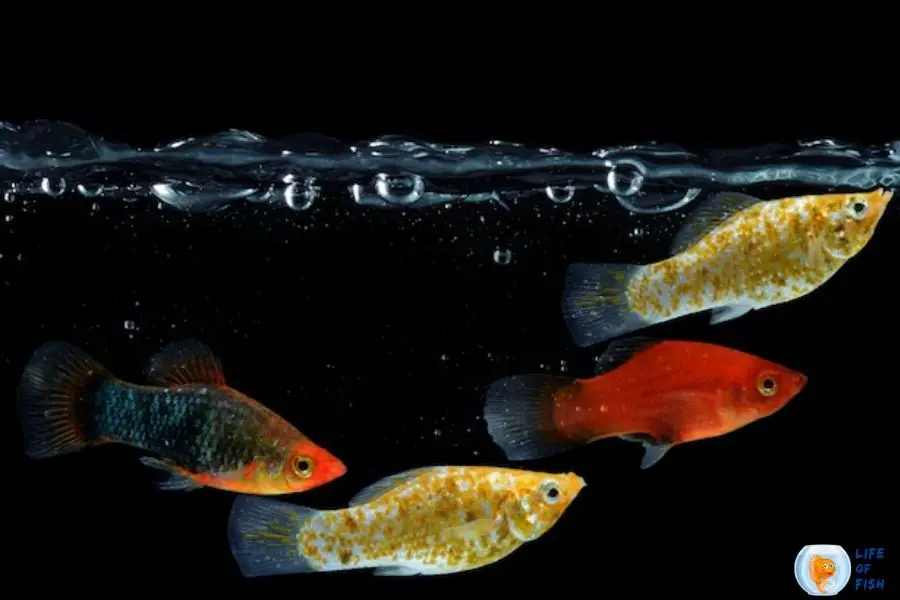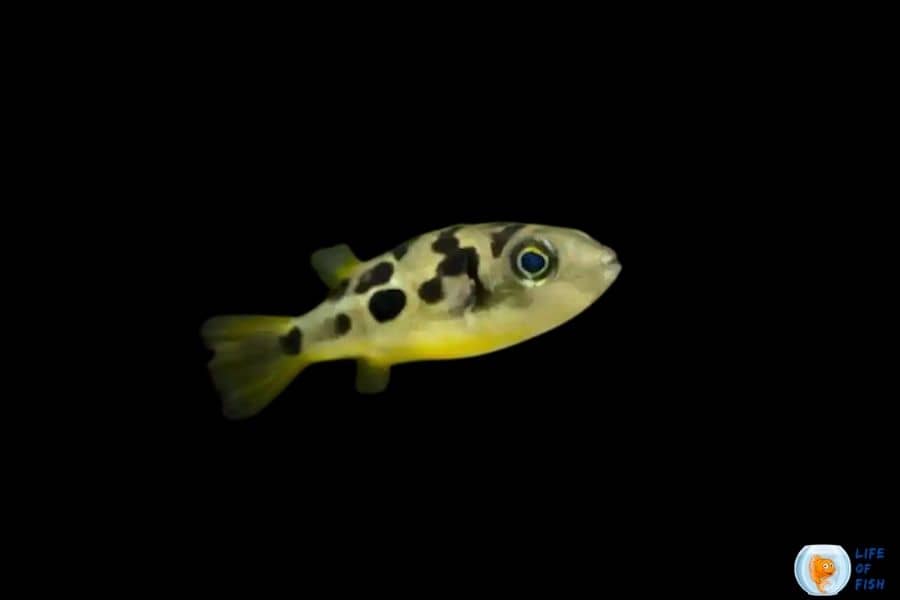Can Fish Recover From Shock? Usually, a fish suffering from shock may die in a matter of hours.
However, if you act fast, you can save your fish from dying. It may take several days for your fish to completely recover from shock, but with the proper care, most fish will fully recover.
As a fish lover, it is definitely scary to see your fish lying on the bottom of the tank, not breathing properly (or not breathing at all). While most aquarists refer to these signs as a sign of stress, it is not. Shock is more life-threatening than stress.
Let’s talk about this matter in more detail.

What Is Shock?
Jump To
- 1 What Is Shock?
- 2 Difference between “stress” and “shock” in fish
- 3 Can fish recover from shock?
- 4 Causes of shock in fish
- 5 Fish shock symptoms
- 6 How long does fish shock last?
- 7 Can fish die from shock?
- 8 How long does it take for a fish to recover from the shock?
- 9 How to save fish from shock (Treatments and Prevention)?
- 10 Final Words
Shock is a condition when the fish’s body is not receiving enough oxygen. This can be caused by a number of factors, including poor water quality, rapid changes in water temperature, etc. (We’ll discuss them below).
Shock usually occurs as a physical reaction of the body when the fish’s surroundings change suddenly.
The fish’s body is not able to adapt to these changes quickly enough, and as a result, the fish suffers from oxygen deprivation.
Shock is usually not deadly if you take proper care of your fish and act quickly. However, if the condition is not treated promptly, it can lead to the death of your fish.
Difference between “stress” and “shock” in fish
While similar factors can cause shock and stress, they are not the same. It is important to understand the difference between these two conditions in order to provide the proper care for your fish.
Shock is a life-threatening condition that can occur suddenly and without warning. On the other hand, stress is a long-term condition that develops over time.
Shock is usually caused by a sudden change in the fish’s environment, such as a sudden change in water temperature or a sudden drop in water quality. On the other hand, stress is usually caused by chronic conditions, such as living in a dirty tank or being bullied by other fish.
While both conditions can be deadly, shock is usually more serious and can lead to death more quickly than stress.
Can fish recover from shock?
As we mentioned above, shock is a life-threatening condition that can occur suddenly and without warning.
If you see your fish suffering from any of the symptoms of shock, it is important to act quickly in order to save fish.
With the proper care, most fish will make a full recovery from shock. However, it may take a number of days for your fish to completely recover.
Causes of shock in fish
There are several reasons why a fish might be shocked, including:
Rapid temperature changes
Fish are usually adopted to live in a stable temperature range. This can be cold for cold-water fish and warm for tropical fish.
If fish get exposed to a temperature that is outside of their comfort range, it can cause shock.
For example, if you put a tropical fish in a tank with too cold water, the fish will be shocked. Similarly, if you put a cold-water fish in a tank with too warm water, the fish will also be shocked.
The ideal water temperature for your fish will depend on the species of fish. Usually, the climate changes don’t happen so rapidly, so the fish have time to adjust to the new temperatures. However, if the temperature changes too quickly, it can cause shock.
Poor water quality
Another common cause of shock is poor water quality. This can be caused by a number of factors, including overfeeding, not cleaning the tank often enough, and using dirty decorations.
If the water in your fish’s tank is not clean, it can build toxins. This can cause shock and even death in fish.
Another way fish goes into shock is if you provide them with bad-quality water. Tap water in some areas is not good for fish due to the high levels of chlorine. If you use such water to fill up your fish tank, it can cause shock.
Further, water in some areas is heavy with metals. These metals can be toxic to fish and cause shock.
Fortunately, you can avoid most of these causes if you carefully maintain your fish tank.
Drastic changes in ph levels
pH is a measure of the acidity or alkalinity of water. Most fish live in water with a pH level between 6.5 and 7.5.
If the pH level of the water changes too much, it can cause shock in fish.
For example, adding too much vinegar to your fish tank can lower the pH level and cause shock. Similarly, adding too much baking soda to your fish tank can raise the pH level and cause shock.
pH can also change when you add some decorations such as corals, peat, or driftwood to your fish tank. However, these changes are usually not drastic enough to cause shock.
If you transfer your fish into another tank with different pH levels, it can also cause shock. For example, if you move your fish from a freshwater tank to a saltwater tank, the change in pH can cause shock.
To avoid shocking your fish, slowly acclimate them to any new tanks or decorations.
Osmotic shock
Some people think that fish like Bettas prefer crystal clear water. Assuming this, they add reverse osmosis (RO) water to their Bettas’ tanks which have 0 ppm.
Reverse osmosis water goes through a process where it is forced through a semi-permeable membrane. This removes all impurities, including dissolved minerals.
While Bettas can live in RO water, it is not ideal. This is because RO water has a very low dissolved mineral content.
When Bettas are in RO water, they are constantly losing minerals through their skin and gills. If they don’t have enough minerals, it can cause osmotic shock.
Osmotic shock is when the fish’s body becomes unbalanced due to a difference in the concentration of minerals on either side of the fish’s cell membranes.
In severe cases, osmotic shock can cause death. However, if the fish is not in RO water for too long, they will usually recover once they are back in the water with normal mineral content.
Sudden rise in nitrate levels
Nitrates are a type of nitrogen compound that is found in fish tanks. They are produced by the breakdown of fish waste and uneaten food.
While nitrates are not poisonous to fish, a sudden rise in nitrate levels can cause shock. This is because the fish’s body is not used to the high levels of nitrates.
A sudden rise in nitrate levels can also cause problems such as difficulty breathing and increased heart rate. In severe cases, it can even lead to death.

Fish shock symptoms
Signs and symptoms can be different depending on the type of fish and the severity of the shock. However, there are some common signs and symptoms that you can look for.
Some common signs and symptoms of fish shock include:
Lying on the bottom of the tank
This is the most common symptom of fish shock. If your fish is lying on the bottom of the tank, it is a sign that they are not feeling well.
Gasping for air at the surface of the water
Since the sudden change in their environment suppresses their ability to breathe oxygen from the water, they will start gasping for air. Fish who get into shock will often gasp for air at the surface of the water.
Floating upside down
In some cases, fish will float upside down at the surface of the water. This is a sign that they are not getting enough oxygen, and their organs are starting to shut down.
Clamped fins
If the fish’s fins are clamped together, it is a sign that they are under stress. Clamped fins can also be a sign of other problems such as low water quality or disease.
Lethargy
If your fish is swimming slower than usual or just lying at the bottom of the tank, it is a sign that they are not feeling well.
Trying to jump out of the tank
In some cases, fish will try to jump out of the tank when they are in shock. This is because they are trying to find a place where the water conditions are better.
Thrashing around
Some fish will thrash around when they are in shock. This is because their body is trying to get rid of the toxins that have entered their system.
Hiding behind the plants and decorations
In some cases, fish will try to hide when they are in shock. This is because they are trying to find a safe place where they can recover.
Important: Although most of these signs and symptoms are related to stress, you can easily identify the signs of “shock” because they appear suddenly after a change in the fish tank environment. If you see any of these signs, it is important to take action immediately.
How long does fish shock last?
The duration of fish shock can vary depending on the type of fish and the severity of the shock.
However, most fish will start to show symptoms within a few hours, and the symptoms will last for about 24 hours or less. So, acting fast is important to ensure the health of your fish.
Can fish die from shock?
Shock is a serious condition that can be fatal if not treated properly.
In most cases, fish will recover from shock if they are quickly moved to a new environment with better conditions. However, if the fish are not treated quickly, they can die from shock within a few hours.
How long does it take for a fish to recover from the shock?
Fortunately, if you observe your fish AS SOON AS they show symptoms of shock, the fish will usually recover quickly.
In most cases, it will take a few hours for the fish to recover from the shock and start swimming normally again.
Sometimes, your fish will take around 2 to 3 days to recover from the shock completely. However, if you do not see any improvement after three days, it is important to consult a veterinarian.

How to save fish from shock (Treatments and Prevention)?
Treatment options for shock in fish can change depending on the cause of the shock. So, let’s discuss each cause of shock in fish and the corresponding treatment options.
Treatment and prevention of Fish Shock Caused by Sudden Temperature Change
One of the major causes of fish getting into shock is rapid changes in temperature. Fish that are living in warm water can be exposed to cold water, which can lead to fish shock and stress.
If the temperature drop is too drastic, it can cause death. To avoid this, it is important to slowly acclimate fish to new temperatures, whether it be warmer or colder.
This can be done by gradually changing the water’s temperature over time so that the fish can adjust slowly and avoid any sudden shocks.
Further, keeping a heater or a chiller in the fish tank can help to maintain a stable temperature and prevent sudden changes that can lead to fish shock. By taking these precautions, you can help ensure the health and safety of your fish.
If you suspect your fish is shocked by temperature changes, it is important to act quickly.
The first thing you need to do is check the water’s temperature and ensure it is within the ideal range for your fish.
If the water is too cold, you can use a heater to raise the temperature gradually. On the other hand, if the water is too warm, you can use a fan to cool the water gradually.
It is also important to provide your fish with plenty of oxygen. This can be done by aerating the water with several air pumps or filters. Taking these precautions can help your fish recover from the shock and avoid further stress.
Treatment and prevention of Fish Shock Caused by Poor Water Quality
Another common cause of fish shock is poor water quality. When the water in the tank is not properly filtered or aerated, it can build toxins and waste, which can be harmful to fish.
In addition, if the maintenance is declined, it can also lead to a sudden change in water quality, which can also be harmful to fish.
To avoid this, it is important to regularly check the water quality and ensure it is within the safe range for fish.
In addition, regularly changing the water and cleaning the tank can also help to maintain water quality and prevent fish shock.
Further, you should not use tap water directly in the fish tank as it can contain chemicals and metals that are harmful to fish.
It is important to use a water conditioner to remove these chemicals and metals before adding the water to the tank.
If you suspect that your fish is in shock due to poor water quality, you first need to check the water quality and ensure it is within the ideal range.
If the water quality is not within the ideal range, you need to take immediate action to correct it. For this, you will have to immediately transfer the fish into another tank with clean and fresh water.
You should also check the filter and make sure it is working properly. If the filter is not working properly, you need to clean it or replace it with a new one.
In addition, you should also check the aeration and make sure it is adequate. Taking these precautions can help your fish recover from the shock and avoid further stress.
Treatment for Fish Shock Caused by sudden changes in pH
pH levels that are too high or too low can also lead to fish shock. Fish that are used to living in water with a neutral pH can be exposed to sudden changes in pH, which can be harmful.
It is important to acclimate fish to new pH levels to avoid this slowly. This can be done by gradually changing the water’s pH over time so that the fish can adjust slowly and avoid any sudden shocks.
Further, you should regularly check the water’s pH levels and ensure it is within the safe range for fish. If the pH levels are not within the safe range, you can use a pH adjuster to raise or lower the pH levels as needed.
When you suspect that your fish is in shock due to a sudden change in pH, you first need to check the pH levels of the water and ensure it is within the ideal range.
If the pH levels are not within the ideal range, you need to take immediate action to correct it. For this, you will have to immediately transfer the fish into another tank with water that has the ideal pH levels.
You should also check the filter and make sure it is working properly. If the filter is not working properly, you need to clean it or replace it with a new one.
In addition, you should also check the aeration and make sure it is adequate. Taking these precautions can help your fish recover from the shock and avoid further stress.
Treatment for Fish Shock Caused by Osmotic Shock
Osmotic shock can be caused by a sudden change in the salinity of the water. This can happen if fish are exposed to fresh water after diving in salt water or vice versa.
Fish that are used to living in freshwater can be exposed to salt water, which can lead to osmotic shock. It is important to acclimate fish to new salinity levels to avoid this slowly.
This can be done by gradually changing the water’s salinity over time so that the fish can adjust slowly and avoid any sudden shocks.
However, most fish species can not acclimate to new salinity levels and will need to be kept in water that is the same salinity as they are used to.
Therefore, it is important to research the fish species before adding them to your tank to make sure they can acclimate to the new salinity levels.
If your fish is shocked due to osmosis, unfortunately, there is not much you can do. Osmotic shock is fatal in most cases, and the only thing you can do is to remove the fish from the water and try to revive it. However, in most cases, the fish will not survive.
Treatment for Fish Shock Caused by Nitrate Poisoning
Nitrate poisoning can be caused by high levels of nitrates in the water.
Nitrates are produced by the breakdown of organic matter, such as fish waste, and can build up to harmful levels in an aquarium if not properly filtered out. Nitrate poisoning can lead to fish shock and death.
To avoid nitrate poisoning, it is important to regularly test the water for nitrates and make sure they are kept at safe levels.
If the nitrate levels are too high, you can do a water change to remove the nitrates from the water. You should also regularly clean the filter to remove any nitrates that have built up in it.
If you suspect that your fish is suffering from nitrate poisoning, you should first test the water for nitrates.
If the nitrate levels are too high, you should do a water change to remove the nitrates from the water. You should also remove any nitrate-producing sources, such as fish waste from the tank.
In addition, you should also check the filter and make sure it is working properly. If the filter is not working properly, you need to clean it or replace it with a new one.
In addition, you should also check the aeration and make sure it is adequate. Taking these precautions can help your fish recover from the shock and avoid further stress.
Final Words
Now you know “Can Fish Recover From Shock” or not. Remember the tips we’ve outlined if you are ever in a situation where your fish appears to be in shock.
The most important thing is to act fast and provide a calm and stress-free environment for your fish until it has fully recovered.
With proper care, most fish will make a full recovery from shock. Have you ever had to save a fish from shock? What methods did you use?
Read Next : Can Fish Recover From Ammonia Poisoning? ( Of Course! )
